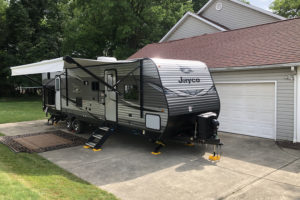If you are planning to tow a travel trailer—whether you are a weekend warrior or full-time RV family—understanding tow weights is non-negotiable. We are talking about the difference between a smooth ride and an overheated transmission (or worse). Whether you are new to the towing world or just need a refresher, let us break it down in plain English.
What Is GVWR (Gross Vehicle Weight Rating)?
GVWR stands for Gross Vehicle Weight Rating—it is the maximum total weight a vehicle or trailer is rated to safely carry. This includes the vehicle itself, all passengers, gear, fuel, and tongue weight (if it is your tow vehicle), or the trailer itself plus all cargo, water, and supplies.
You can find the GVWR label:
- On your tow vehicle, usually on the driver’s side door jamb or inside the owner’s manual.
- On your trailer, usually on the tongue frame or inside a cabinet near the front.
Other Tow Weight Terms You Need to Know
- Curb Weight: What your vehicle weighs empty, with standard fluids and fuel.
- Payload: The amount of weight your vehicle can carry inside (passengers and gear).
- Tongue Weight: The downward pressure your trailer puts on the hitch.
- GCWR (Gross Combined Weight Rating): The total your tow vehicle + trailer can weigh together.
- Towing Capacity: What your vehicle can safely tow, according to the manufacturer.
Doing the Math: How to Match Trailer to Tow Vehicle
To make sure your setup is safe:
1. Check the towing capacity of your vehicle. If your truck or SUV has a 7,500 lb max tow rating, that includes everything in and on the trailer.
2. Compare it to your trailer’s GVWR. Let’s say your trailer GVWR is 6,500 lbs. Add gear, water, and food? You are getting close.
3. Do not exceed 80% of your vehicle’s max towing capacity. This gives you a safety buffer for wind, hills, and wear.
Example:
- Truck towing capacity: 8,000 lbs
- Trailer GVWR: 6,500 lbs
- Ideal towing weight (80% of 8,000): 6,400 lbs
You are safe—but barely. That is why it pays to know your numbers.
Tire Talk: Why GVWR Affects Your Tires
Tires are often overlooked, but they are critical to your safety—on both your tow vehicle and trailer. Tires must match or exceed the GAWR (Gross Axle Weight Rating) and GVWR.
Trailer Tires (ST-rated):
- ST tires are made for higher load-bearing and lower speeds.
- Check the load range (C, D, E) and max pressure listed on the tire.
- Replace old or weather-cracked tires even if they have tread left.
Tow Vehicle Tires:
- Look for Load Index and Speed Rating on the sidewall.
- Make sure they are rated for towing—many all-season tires are not.
- Consider upgrading if you carry extra gear or tow frequently.
Final Tow Tips from the Road
- Always weigh your trailer loaded at a truck stop or RV dealer.
- Distribute your weight evenly. Uneven loads increase sway risk.
- Upgrade your brakes and suspension if your setup is near the limit.
- Consider a tire pressure monitoring system (TPMS) for long trips.
🚙 Safety First, Fun Always
Learning tow weight math might not be the most exciting part of camping, but it is one of the most important. With the right setup, the road feels a whole lot less stressful—and a whole lot more fun.



